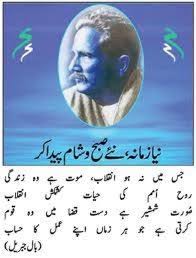Urdu Poetry Of Iqbal Biography
Source (google.com.pk)
Sir Muhammad Iqbal (November 9, 1877 – April 21, 1938), also known as Allama Iqbal, was a philosopher, poet and politician[1] in British India who is widely regarded as having inspired the Pakistan Movement. He is considered one of the most important figures in Urdu literature, with literary work in both the Urdu and Persian languages.
Iqbal is admired as a prominent classical poet by Pakistani, Indian, Iranian, and other international scholars of literature. Though Iqbal is best known as an eminent poet, he is also a highly acclaimed "Muslim philosophical thinker of modern times". His first poetry book, Asrar-e-Khudi, appeared in the Persian language in 1915, and other books of poetry include Rumuz-i-Bekhudi, Payam-i-Mashriq and Zabur-i-Ajam. Amongst these his best known Urdu works are Bang-i-Dara, Bal-i-Jibril, Zarb-i Kalim and a part of Armughan-e-Hijaz. In Iran and Afghanistan, he is famous as Iqbal-e Lahori (Iqbal of Lahore), and he is most appreciated for his Persian work. Along with his Urdu and Persian poetry, his various Urdu and English lectures and letters have been very influential in cultural, social, religious and political disputes over the years.
Iqbal is commemorated widely in Pakistan, where he is regarded as the ideological founder of the state. His Tarana-e-Hind is a song that is widely used in India as a patriotic song speaking of communal harmony. His birthday is annually commemorated in Pakistan as Iqbal Day, a national holiday. Iqbal is the namesake of many public institutions, including the Allama Iqbal Campus Punjab University in Lahore, the Allama Iqbal Medical College in Lahore, Iqbal Stadium in Faisalabad, Allama Iqbal Open University in Pakistan, the Allama Iqbal International Airport in Lahore, the Allama Iqbal hall in Nishtar Medical College in Multan and Gulshan-e-Iqbal Town in Karachi and Allama Iqbal Hall at AMU, India.
The government and public organizations have sponsored the establishment of educational institutions, colleges and schools dedicated to Iqbal, and have established the Iqbal Academy to research, teach and preserve the works, literature and philosophy of Iqbal. Allama Iqbal Stamps Society established for the promotion of Iqbaliyat in philately and in other hobbies. His son Javid Iqbal has served as a justice on the Supreme Court of Pakistan. Javaid Manzil was the last residence of Allama Iqbal.
The spirit of change is evident in poems like Bilad-e-Islamia (the lands of Islam), Wataniat (Nationalism), Muslim, Fatima Bint Abdullah (who was killed in the siege of Cyrainca, Siddiq, Bilal, Tahzib-e-Hazir (Modern civilization) and Huzoor-e-Risalat Maab Mein (in the presence of Sacred Prophet).
In these poems, Iqbal deplores the attitude of Muslim leaders who lay a claim to Islamic leadership and yet are devoid of a genuine spiritual attachment to the blessed Prophet.
The last phase of Iqbal’s life was embittered with constant illness. But as regards his creative activities this product was most productive. He kept in touch with every question of the day and continued composing beautiful verses.
A few minutes before his death he recited these touching lines:
The departed melody may return or not!
The zephyr from Hijaz may blow again or not!
The days of this Faqir has come to an end,
Another seer may come or not!
Although Iqbal’s was long and protracted the end was sudden and verypeaceful. He breathed his last in the early hours of April 21, 1938, in the arms of his old and devoted servant, leaving behind a host of mourners all over the Islamic world. There was a faint smile playing on his lips, which irresistibly reminded one of the last criterions, which he laid down for a truthful Muslim.
Tehni Pe Kisi Shajar Ki Tanha
Bulbul Tha Koi Udaas Betha
Kehta Tha Ke Raat Sar Pe Aai
Urney Chugney Mai Din Guzara
Pohchun Kis Tarah Aashiyaan Tak
Har Cheez Pe Chaa Gaya Andhera
Sun Ke Bulbul Ki Aah-O-Zaari
Jugnu Koi Paas Hi Se Bola
Hazir Hun Madad Ko Jaan-O-Dil Se
Keera Hun Agarcha Mai Zara Sa
Kiya Gham Hai Jo Raat Hai Andheri
Mai Raah Mai Roshni Karonga
ALLAH Ne Di Hai Mujh Ko Mashal
Chamka Ke Mujhe Diya Banaya
Hain Log Wohi Jahan Mai Ache
Aate Hain Jo Kaam Dosron Ke
Urdu Poetry Of Iqbal

Urdu Poetry Of Iqbal


Urdu Poetry Of Iqbal


Urdu Poetry Of Iqbal


Urdu Poetry Of Iqbal


Urdu Poetry Of Iqbal


Urdu Poetry Of Iqbal


Urdu Poetry Of Iqbal


Urdu Poetry Of Iqbal

Urdu Poetry Of Iqbal
No comments:
Post a Comment